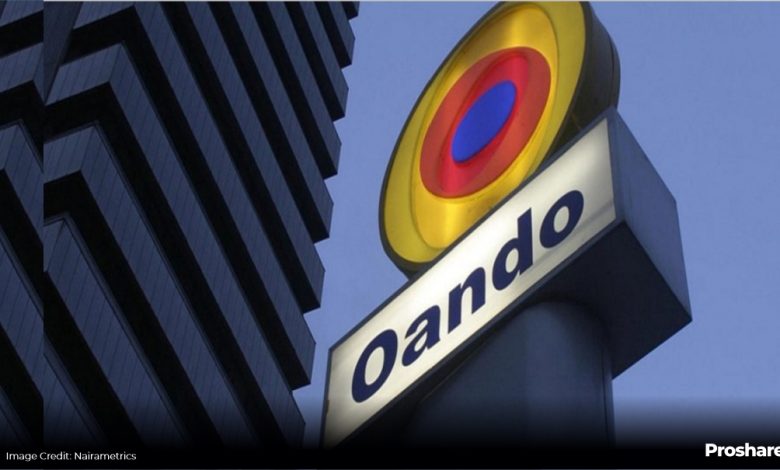Oando Plc’s Revenue Declines 20% Amidst Energy Market Volatility, Profit Surges on Tax Credit

Oando Plc, a prominent player in Nigeria’s energy sector, has reported a significant decline in revenue, with a 20% drop to N2.54 trillion for the nine months ended September 30, 2025, amidst a volatile energy market. However, in a striking contrast, the company’s profit after tax has surged to N201.30 billion, lifted by a substantial tax credit. This unexpected turnaround has raised eyebrows, highlighting the company’s ability to navigate the challenges of the energy sector, even as it grapples with declining revenue and high operating costs.
Oando Plc, a leading player in the Nigerian energy sector, has been facing significant challenges in recent times. The company’s revenue from contract with customers declined by 20% to N2.54 trillion for the nine months ended September 30, 2025, compared to N3.19 trillion in the same period in 2024. This decline has had a corresponding impact on the company’s profitability, with the company reporting an operating loss of N109.73 billion. However, Oando Plc’s profit after tax stood at N201.30 billion, driven by a significant tax credit. The company’s finance income also increased significantly, driven by higher interest income and a reversal of prior default interest. This suggests that the company’s profitability is being propped up by non-operating income, rather than its core business operations.
Despite the challenges, Oando Plc remains optimistic about the future. The demand for energy is expected to continue growing in Nigeria, providing opportunities for the company to increase its revenue. The company is also exploring opportunities to expand into new markets, both within and outside Nigeria. With its strong financial position and diversified revenue streams, Oando Plc is well-positioned to navigate the challenges in the energy sector and emerge stronger in the future.
Oando Plc – Fine-Tuning Operations for a Brighter Future
In the midst of a challenging energy landscape, Oando Plc has continued to fine-tune its operations, demonstrating its ability to adapt and thrive in a competitive environment. The company’s focus on improving its cash management ability has yielded positive results, with a re-jigged debt profile and improved liquidity. Oando Plc’s working capital management has shown signs of improvement, with a shorter cash cycle of 102 days, down from 121 days in the previous year. This is largely due to the company’s ability to delay payments to creditors, stretching the period to 55 days from 36 days. However, this has been partially offset by a lengthening of the days receivable period to 26 days from 22 days, indicating that the company is taking slightly longer to collect payments from debtors.
The company’s inventory management has also shown improvement, with stocks spending less time in the warehouse before being shipped to customers. Inventory days have reduced to 131 days from 135 days, indicating a more efficient supply chain. Despite these improvements, Oando Plc’s current ratio has declined, indicating a potential liquidity challenge. This is largely due to the company’s recourse to bank overdrafts, which have increased to N3.7 billion from zero in the previous year. However, the company’s overall financial leverage has improved, with a reduction in term loans making it more attractive to investors.
Oando Plc’s management has demonstrated its commitment to continuous improvement, with plans to invest N9.62 billion in upgrading facilities, up from N1.2 billion in the previous year. This investment is expected to drive future growth and improve profitability, making it an attractive proposition for investors. The company’s focus on quality and excellence has been recognized internationally, with several awards and certifications. While the specific awards and certifications are not mentioned, it is clear that Oando Plc is committed to delivering high-quality products and services to its customers.
In conclusion, Oando Plc has made significant strides in fine-tuning its operations, improving its cash management ability, and driving growth through strategic investments. The company’s commitment to excellence and quality is evident, and its focus on continuous improvement positions it well for future success.
SWOT Analysis for Oando Plc
Strengths:
- Diversified revenue streams: Oando Plc has a diversified revenue stream, with revenue from contract with customers standing at N2.54 trillion for the nine months ended September 30, 2025.
- Strong financial position: The company has a strong financial position, with cash and cash equivalents (excluding bank overdrafts) of N143.76 billion as of September 30, 2025.
- Investments in associates: Oando Plc has investments in associates, which generated a share of profit of N1.18 billion for the nine months ended September 30, 2025.
Weaknesses:
- Declining revenue: Oando Plc’s revenue from contract with customers decreased from N3.19 trillion in 2024 to N2.54 trillion in 2025, indicating a decline in revenue.
- High operating costs: The company’s cost of sales was N2.43 trillion for the nine months ended September 30, 2025, indicating high operating costs.
- Negative other operating income: Oando Plc reported a negative other operating income of N287.19 billion for the nine months ended September 30, 2025.
Opportunities:
- Growing demand for energy: The demand for energy is expected to continue growing in Nigeria, providing opportunities for Oando Plc to increase its revenue.
- Expansion into new markets: The company can explore opportunities to expand into new markets, both within and outside Nigeria.
- Diversification of products and services: Oando Plc can diversify its products and services to reduce its dependence on a single revenue stream.
Threats:
- Competition from other energy companies: Oando Plc faces competition from other energy companies, both local and international.
- Volatility in oil prices: The company’s revenue is sensitive to changes in oil prices, which can be volatile.
- Regulatory risks: Oando Plc is subject to various regulations and laws, which can change and impact its operations.




